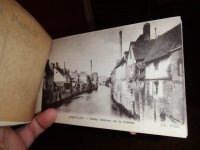We went out today to a local antiques market. She bought a large wooden apothecary mortar and pestle. She now has a collection of three (and counting) mortar and pestles. It seems you can't have too many on the kitchen sideboard for crushing/mixing herbs and spices. I on the other hand spent time in the book section at the market, and came away with my own collection of sorts.
"Flint and Feather - The Complete Poems of E. Pauline Johnson ( Tekahionwake)". Pauline Johnson was a Mohawk from the Six Nations Reserve near Brantford Ontario, and is most famous for her poem "The Song My Paddle Sings". Her writing is sublime.
"The Collected Works of Grey Owl - The Men of The Last Frontier, Pilgrims of The Wild, Sajo And The Beaver People." Archibald Belaney was English born, and emigrated to northern Ontario at 17 yrs old to follow his fascination with Native culture. He returned after WW1 to stay and live amongst them, adopting their language, skills, lifestyle and even appearance. He was given his adopted name Grey Owl. He might be regarded as a fraudster, but as he wrote about paddling, trapping and guiding in Ontario, he became one of Canada's most loved naturalists and conservationists.
"Devil in Deerskins - My Life With Grey Owl by Anahareo." Anahareo was a Mohawk, who met Grey Owl in Temagami in 1925. Together they trapped and lived in the Ontario and Quebec wilderness.
"Kiss of The Fur Queen by Thomson Highway." Thomson Highway is a Cree from northern Manitoba, and in this novel tells of two young native brothers and their struggles to find their way amidst cultural upheaval.
It looks like I've got some reading to do, as the days get shorter.
"Flint and Feather - The Complete Poems of E. Pauline Johnson ( Tekahionwake)". Pauline Johnson was a Mohawk from the Six Nations Reserve near Brantford Ontario, and is most famous for her poem "The Song My Paddle Sings". Her writing is sublime.
"The Collected Works of Grey Owl - The Men of The Last Frontier, Pilgrims of The Wild, Sajo And The Beaver People." Archibald Belaney was English born, and emigrated to northern Ontario at 17 yrs old to follow his fascination with Native culture. He returned after WW1 to stay and live amongst them, adopting their language, skills, lifestyle and even appearance. He was given his adopted name Grey Owl. He might be regarded as a fraudster, but as he wrote about paddling, trapping and guiding in Ontario, he became one of Canada's most loved naturalists and conservationists.
"Devil in Deerskins - My Life With Grey Owl by Anahareo." Anahareo was a Mohawk, who met Grey Owl in Temagami in 1925. Together they trapped and lived in the Ontario and Quebec wilderness.
"Kiss of The Fur Queen by Thomson Highway." Thomson Highway is a Cree from northern Manitoba, and in this novel tells of two young native brothers and their struggles to find their way amidst cultural upheaval.
It looks like I've got some reading to do, as the days get shorter.
Last edited:

